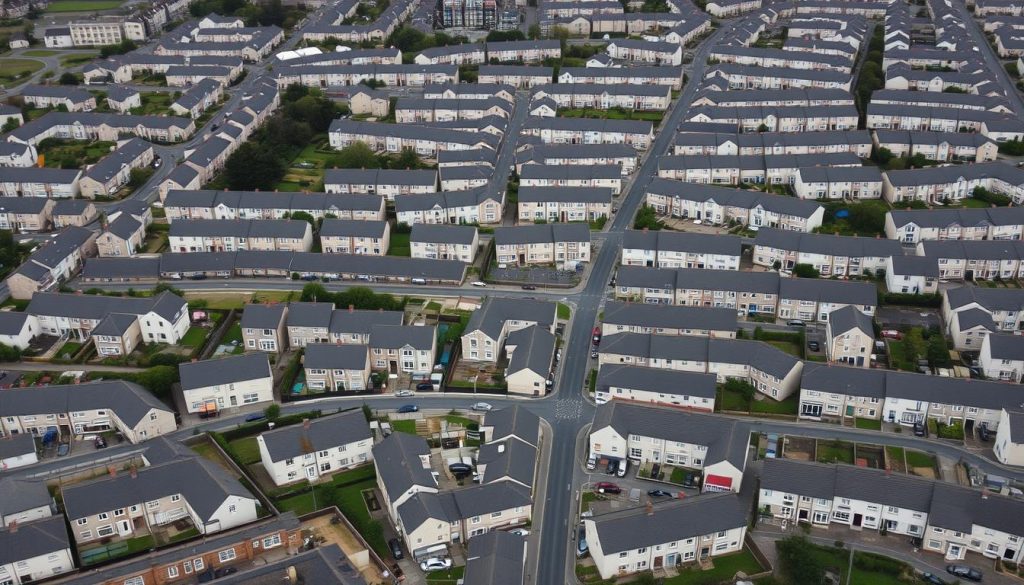Living in Ireland means spending a lot on where you live. The Central Statistics Office (CSO) tells us that a big chunk of what people earn goes on their homes. With prices going up, families find more of their budget goes into keeping a roof over their heads. Housing costs stand out, even when we compare them to other everyday expenses.
- The Rising Cost of Rent in Ireland
- House Prices in Major Irish Cities
- The Impact of Housing Costs on Irish Families
- Average Cost of Housing in Rural vs Urban Areas
- Factors Influencing Housing Costs in Ireland
- Housing is one of the largest components of the living expenses.
- Comparing Housing Costs: Ireland vs. the United Kingdom
- Long-Term Settling Strategies in Ireland
- Government Policies Affecting Housing Costs
- Affordable Housing Initiatives in Ireland
- The Role of Foreign Investment in Housing Prices
- The Future of the Housing Market in Ireland
- FAQ
When we look at the housing market, experts agree: it’s tough to afford a place. This challenge is changing how people manage their money. It means having to think hard about how much you can spend.
Key Takeaways
- Housing expenses make up a substantial part of living costs in Ireland.
- CSO data indicate that a significant percentage of income is spent on housing.
- Comparative analysis shows housing to be a dominant living expense.
- Escalating house prices have increased income allocation to housing.
- Economic reports highlight the growing concern of housing affordability.
The Rising Cost of Rent in Ireland
Rent inflation is a significant issue in Ireland’s rental market. Historical data from the Residential Tenancies Board (RTB) shows a clear upward trend. This has placed a huge burden on renters.
Rent prices have shot up in Ireland recently. The Housing Agency notes a 30% rise in just five years. This situation highlights how economic factors are making life hard for tenants.
An in-depth look at RTB data shows the effect of rising rents in various places. For example:
| Year | National Average Rent (€) | Annual Increase (%) |
|---|---|---|
| 2018 | 1,200 | 8.7 |
| 2019 | 1,300 | 8.3 |
| 2020 | 1,375 | 5.8 |
| 2021 | 1,450 | 5.5 |
| 2022 | 1,550 | 6.9 |
High rents don’t just hit wallets; they affect lives. Stories from tenants reveal hard choices and compromised quality of life. Many are struggling to afford basic needs.
There’s a pressing need to address rent inflation in Ireland. Solving this problem is crucial. It will prevent rent prices from unfairly targeting renters, protecting our economy and tenant well-being.
House Prices in Major Irish Cities
Understanding the Irish housing market means looking closely at each city. This part focuses on the housing in Dublin and Cork. They are major cities in Ireland.
Understanding Dublin’s Housing Market
Dublin’s housing market is tough due to the high demand and limited supply. This situation has caused Dublin property prices to rise quickly. Over the last ten years, Dublin’s house prices have gone up a lot, reports the Property Price Register.
The Economic and Social Research Institute (ESRI) points out that buying a house in the city is hard for first-timers. Estate agents say houses in central Dublin are really expensive. Many cost more than €500,000.
Cork: Housing Trends and Costs
The Cork real estate market is more affordable than Dublin’s, although prices are going up. The Property Price Register shows that Cork’s house prices are increasing but not as fast as Dublin’s.
The ESRI says Cork’s market is still competitive but offers more choices. According to local agents, Cork has a range of homes available. These include expensive apartments in the city and cheaper houses in the suburbs.
The Impact of Housing Costs on Irish Families

High housing costs in Ireland put a lot of pressure on families. They must rethink their budgets. They look at ways to cope, economic challenges, and state help for relief.
Budgeting for Housing
Irish families are getting creative with their budgets due to high housing costs. The Central Statistics Office finds they’re cutting costs elsewhere. They pick essential costs over less critical ones and look for cheaper homes. This helps keep housing costs under control.
Financial Strain and Housing
Housing costs cause financial stress, affecting family health and well-being. Families struggle to afford basics like food and healthcare. High housing costs can lead to more debt, harming mental and physical health. These studies show how deep housing costs affect families and their money.
Government Assistance and Support
The Irish government helps with housing costs through various programs. One key program is the Housing Assistance Payment (HAP). It helps low-income families pay rent. This aid lessens the financial load and helps with stability. Government programs are crucial for families, allowing them to spend on other important things.
| Support Programme | Purpose | Beneficiaries |
|---|---|---|
| Housing Assistance Payment (HAP) | Financial aid for private rental accommodations | Low-income families and individuals |
| Local Authority Housing | Provision of public housing | Families in need of social housing |
| Rent Supplement | Support for short-term rent payments | Individuals facing temporary financial hardship |
These programs show the government’s role in making housing more accessible. They aim to keep housing affordable for everyone in Ireland.
Average Cost of Housing in Rural vs Urban Areas
The difference in housing prices between rural and urban areas in Ireland greatly affects living costs. In major cities like Dublin and Cork, homes cost much more than in the countryside. This gap is due to various reasons such as available amenities, job opportunities, and demand.
Urban areas have many services and offer higher salaries, but rural regions provide cheaper homes. Homes in the countryside are not just more affordable. They also typically have more land, unlike the smaller homes in cities. So, where people decide to live is heavily influenced by this price difference.
To give a clearer picture, here’s a table showing housing costs in different places:
| Location | Average Property Price | Average Rent (per month) |
|---|---|---|
| Dublin (Urban) | €500,000 | €2,200 |
| Cork (Urban) | €350,000 | €1,600 |
| Galway (Urban) | €300,000 | €1,400 |
| Rural Areas | €200,000 | €900 |
Experts say that despite higher urban living costs, rural areas offer a cheaper lifestyle. With the rural housing market offering less expensive choices, it’s key to understand these differences. This knowledge helps buyers and renters make sense of Ireland’s complex housing scene.
Factors Influencing Housing Costs in Ireland
Housing costs in Ireland are shaped by many factors. These range from economics to the specific location of a property. Let’s explore these key influences.
Economic Variables
The economy plays a big role in housing costs. Things like GDP growth, job rates, and inflation matter a lot. A strong economy means more people want homes, raising prices. But if the economy struggles, house prices can drop.
Supply and Demand Dynamics
How many homes are available versus how many people want them affects prices. If lots of people want homes but there aren’t enough, prices go up. The speed of building and available land influence this. So does how fast the population grows compared to new houses.
Location-Specific Trends
Where a house is located changes its price. Cities like Dublin and Cork have high demand because of jobs and amenities. This makes city centre homes pricier. Rural areas might be cheaper, but they don’t have the same job opportunities or services.
Housing is one of the largest components of the living expenses.

In Ireland, housing costs are a huge part of living expenses. They are one of the biggest financial challenges for people. These costs take up more money than most other things in the Irish budget.
Reports from the Central Statistics Office (CSO) show this clearly. Costs for housing, like rent and mortgages, eat up a lot of the monthly budget. They are much higher than healthcare, education, and transport costs.
Let’s delve into a comparative analysis:
| Expense Category | Percentage of Total Expenses |
|---|---|
| Housing (Rent/Mortgage) | 35% |
| Healthcare | 15% |
| Education | 10% |
| Transportation | 20% |
| Other Miscellaneous Costs | 20% |
This comparison shows why housing is a top cost for many families. Studies by financial advisors say the same thing. They show that housing is a big strain on Irish households’ budgets.
Also, economy articles say housing is very important in consumer economics. House prices and rent are rising faster than other expenses. It’s very important for people to manage their money well.
Comparing Housing Costs: Ireland vs. the United Kingdom
When we look at housing in Ireland and the United Kingdom, we see big differences. These differences affect how much people pay for rent and their mortgages. Our analysis will help those thinking about moving to understand these costs better.
Overall Housing Market Comparison
In the past few years, housing prices have gone up in both countries. However, the reasons are not the same. In Ireland, not having enough houses and more people wanting them, especially in cities, has pushed up prices. On the other hand, prices in the UK have been affected by different factors in each region and uncertainties like Brexit.
| Aspect | Ireland | United Kingdom |
|---|---|---|
| Average House Price | €300,000 | £250,000 |
| Annual Price Increase | 5% | 4% |
| Urban vs. Rural Price Differentials | Higher in Dublin and Cork | Higher in London and South East |
| Key Influencing Factors | Supply shortages | Regional economic disparities |
Rent vs. Mortgage Expenses
Comparing rent to mortgage expenses is crucial when analysing housing costs. Renting might seem cheaper now but might not be the best option later. However, this rent versus mortgage debate differs in these regions.
In cities like Dublin, renting can be very costly. It can be more expensive than a mortgage on the same kind of property. This makes buying a home more appealing to those who can afford it.
The UK’s situation is different, especially in London where rents are very high. Yet, outside London, rents can be more reasonable. So, where you are in the UK really matters when comparing rent to mortgages.
Long-Term Settling Strategies in Ireland
Are you thinking about settling in Ireland for a long time? Deciding whether to rent or buy is very important. Think about your money situation, what you want for the future, and how the market is doing. Using your savings and investments well can help you a lot if you want to own a home in Ireland.
Renting vs. Buying
When you can’t decide if you should rent or buy a house in Ireland, look closely at the pros and cons of each. Renting means you can move easily and don’t have to pay a lot right away. This is good if you’re not sure you want to stay in one place forever. But, owning a house can be a smart way to invest your money. It usually leads to making money over time and feeling more stable.
Many people who decided to buy their home in Ireland feel happy about it. They like that their house’s value went up and that it’s truly theirs.
Savings and Investments
If you want to own a home, it’s important to focus on saving money and investing. Experts in Ireland say you should save some of your earnings for housing. By putting your money in different places, you can make more money. This helps you afford a house or even buy one without needing a loan.
It’s smart to save regularly and make good investment choices to increase your money. Look at how other people who now own their homes in Ireland did it through saving and investing wisely.
| Aspect | Renting | Buying |
|---|---|---|
| Flexibility | High | Low |
| Initial Costs | Lower | Higher |
| Long-term Financial Benefits | Moderate | High |
| Property Ownership | No | Yes |
In the end, if you’re planning to settle in Ireland, think well about renting versus buying. Also, saving and investing wisely is key for a good start in property investment in Ireland.
Government Policies Affecting Housing Costs

Government strategies greatly influence housing affordability and the real estate market. Housing rules are key in the Irish housing sector. They affect how much housing costs across the country.
Zoning laws control land use, which affects housing types and availability. Tax rules also play a big role in property prices. Together, these shape how the government tries to keep the housing market stable.
Reports on housing laws show attempts to make changes for the better. These changes aim to make homes more affordable in cities and countryside. They help us see how laws shape the housing market and what might happen next.
Experts have looked into what these rules mean. Lawyers and market analysts have seen how these policies help, but also where they fall short. Their work gives a full picture of the laws’ effects on people.
The public’s views on these policies are important too. Feedback from people and groups influences future laws. This helps improve housing laws for everyone’s benefit.
| Policy Type | Impact on Housing Costs |
|---|---|
| Zoning Laws | Regulates land use and housing supply |
| Tax Policies | Influences property price and developer incentives |
| Legislative Reforms | Aims to increase affordability and accessibility |
In summary, government policies clearly affect housing costs in Ireland. From land use laws to tax benefits, these rules define the housing market. Keeping up reforms and listening to the public is crucial for making policies that meet people’s housing needs.
Affordable Housing Initiatives in Ireland
The challenge of securing affordable housing in Ireland has sparked various responses. These include government programmes and private initiatives. This article explores the key efforts and their success in solving this important problem.
Government Schemes
The government’s housing programmes are at the forefront of providing affordable homes. ‘Rebuilding Ireland’, initiated by the Department of Housing, Planning and Local Government, aims to increase housing supply. It also seeks to bring stability to the rental sector and support those in need.
The programme breaks down into five pillars. These cover increasing supply, supporting rentals, refurbishing empty houses, improving social housing, and aiding the homeless. Each pillar is designed to tackle different aspects of the housing crisis comprehensively.
Private Sector Solutions
Private initiatives also play a critical role in making homes more affordable. One way is through collaborations between private developers and local governments. The Public-Private Partnership (PPP) model is an example of this. It combines private sector’s efficiency and funds to deliver housing projects in a cost-effective and timely manner.
- Public-Private Partnerships (PPP)
- Build-to-Rent (BTR) models
- Community-led housing initiatives
The effectiveness of these private efforts often depends on supportive government policies and efficient approval processes. Threshold, a non-governmental organisation, suggests these initiatives are promising. Yet, they need more governmental support and alignment to reach their full potential.
| Programme | Key Features | Effectiveness |
|---|---|---|
| Rebuilding Ireland | Supply increase, rental stability, social housing | High, with ongoing improvements |
| Public-Private Partnerships | Large-scale projects, cost-effective | Moderate, dependent on policy support |
| Build-to-Rent Models | Dedicated rental developments | Emerging, requires more widespread adoption |
The Role of Foreign Investment in Housing Prices
The foreign investment impact on the Ireland housing market has been big. It has helped increase housing prices and changed the local economy. Money from international property investors has been crucial. It has helped build new real estate projects and improved infrastructure and housing availability.
But this boost has its downsides. More competition from international property investors makes houses costlier. This makes it hard for locals to buy homes. High prices are more common in main areas. Here, costs have gone up a lot compared to the national average.
In cities like Dublin and Cork, housing prices have really gone up because of international property investors. This situation makes us think about housing being affordable and available to average Irish people. Below is a table showing the increase in property prices due to foreign investments.
| Year | Dublin Average Housing Price (EUR) | Cork Average Housing Price (EUR) | National Average (EUR) |
|---|---|---|---|
| 2015 | 280,000 | 220,000 | 250,000 |
| 2018 | 348,000 | 265,000 | 295,000 |
| 2021 | 412,000 | 315,000 | 340,000 |
| 2023 | 468,000 | 370,000 | 400,000 |
In conclusion, foreign investment impact has many good points for the Ireland housing market. But we must solve the problem of homes becoming too expensive. We need to make sure Irish people can still buy houses. Experts in property continue to study this issue and what it means for the economy.
The Future of the Housing Market in Ireland
Understanding the future of Ireland’s housing market is now more important than ever. Economic changes and new living patterns play big roles. Experts from real estate research, the Central Bank of Ireland, and housing discussions give us a glimpse into what’s coming.
Projected Trends
The need for homes in Irish cities and suburbs is on the rise. Dublin will still attract many due to job opportunities and facilities. Suburbs are becoming popular because people can work from home, making family life more flexible. Experts predict steady prices and a turn towards greener homes.
Economic Forecasts
The Central Bank of Ireland has made some economic predictions. These include how interest rates, jobs, and inflation will affect housing. A strong economy and jobs market should keep demand for houses healthy. Meetings about housing also talk about how government actions can help keep the market stable and homes affordable.
To sum up, the outlook for Ireland’s housing is carefully hopeful. With a solid economy and helpful government policies, growth should be steady but sustainable. It’s crucial for those involved in housing to keep up with these changes.

















